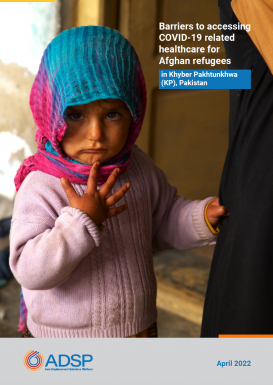ADSP Study: Barriers to accessing COVID-19 related healthcare for Afghan refugees in Khyber Pakhtunkhwa, Pakistan
Pakistan is hosting more than 1.44 million registered Afghans1 who have been forced to flee their homes, primarily due to war, internal conflict, insecurity, and persecution. Most refugees live in Khyber Pakhtunkhwa (KP) Province, located along the Afghan border2. Of these, 990,947 are registered outside Refugee Villages3 while a further 444,439 are registered inside Refugee Villages.4 This study serves to understand the underlying barriers to accessing COVID-19 information, testing facilities, treatment options, and vaccination among Afghan refugees and host communities in Khyber Pakhtunkhwa, Pakistan. More specifically, the study aims to analyse:
- Inclusiveness of the Pakistan government’s COVID-19 response from the perspective of Afghan refugees, as well as potential gaps
- Knowledge and perceptions of Afghan refugees about the virus, prevention protocols, response services and efficacy of communication strategies
- Whether the COVID-19 pandemic has been an opportunity to promote wider health-seeking behaviors among Afghan refugees
- Requirements from health providers for engaging with Afghan refugee communities, adapting service delivery to enhance their willingness to seek healthcare
- The current policy frameworks in Pakistan for treatment, and inclusion of refugees in COVID-19 vaccination programmes.
The data was collected from 15 September to 14 October 2021, using Key Informant Interviews (KIIs), Focus Group Discussions (FGDs), and questionnaires. The primary data was collected from Afghan refugees in Peshawar and Swabi in KP, as well as Islamabad. Importantly, a gender-sensitive process was followed to select an almost-equal number of respondents from both genders. In this regard, 47 percent of KIIs and 50 percent of focus group discussions were undertaken with females.
Afghan citizens living in Pakistan can be categorized into three groups i.e., Proof of Registration (PoR) cardholders, Afghan Citizen Card (ACC) holders, and unregistered Afghans. Whilst PoR cardholders have general access to public services, ACC cardholders only have limited access while unregistered refugees, on the other hand, have difficulty accessing most services including securing rental accommodation, registering for mobile phone services, opening bank accounts, or starting a business.5 They also face difficulties accessing health facilities and economic opportunities. Most importantly, unregistered Afghan refugees are not officially considered as refugees neither by the Government of Pakistan, nor by the United Nations High Commissioner for Refugees (UNHCR). Beside this, the Government of Pakistan does not officially allow CSOs, NGOs, and INGOs to provide support to unregistered refugee populations. Of the total number of Afghans living in Pakistan, only around 30 percent of Afghan refugees reside in the Refugee Villages, while most Afghans live outside the camps (in urban communities), who do not receive any form of government assistance, especially as it relates to accessing legal support. SHARP-Pakistan is the only entity that provides or facilitates Afghan refugees access to legal support.
At the beginning of the COVID-19 pandemic, most Afghan refugees in Pakistan considered COVID-19 a form of ‘media hype’. This attitude shifted in mid-2020 when greater numbers of refugees started to fall ill. According to data, 4 percent of respondents in Islamabad and 10 percent in Peshawar contracted COVID-19. This conflicts with official government data that refers to only 37 positive cases and 11 refugee deaths6 since March 2020. According to primary data, rather than considering the pandemic a major health risk, most Afghans were concerned about the economic implications, especially as opportunities for daily labourers shrunk. As a result, 95 percent of respondents stated that they borrowed money from fellow refugees to meet their daily expenses.
During COVID-19, only a limited number of PoR cardholders were able to receive support from the UNHCR. In May 2020, approximately 20 percent of ARs received a one-time amount of PKR 12000/- (70 USD) from the UNHCR through the Commissionerate for Afghan Refugees (CAR). Whilst such support undoubtedly helped to mitigate immediate economic hardship, this amount was short of what was required to provide even subsistence needs. The ACC holders and unregistered Afghans were not included in any formal support program during the COVID-19 crisis, including the Ehsaas programme. However, regardless of their status, refugees could access healthcare at WHO supported facilities and those operated by implementing partners during the pandemic.
Afghan refugees faced numerous barriers in accessing COVID-19 related services such as quarantine facilities and vaccinations. Most research respondents noted that COVID-19 testing was quite accessible, whilst quarantine and vaccination services were significantly more difficult to access. Many valid PoR cardholders were unaware of their rights or the prescribed processes. A significant gender disparity in relation to knowledge and access to COVID-19 health services and treatment was also noted. Women generally had less knowledge about testing, treatment or vaccination options, primarily due to limited exposure to wider communication streams. This, coupled with cultural norms whereby women are often unable to make independent health or economic decisions, played an additional role in reducing their access to health services.
As the pandemic evolved, there was an incremental realisation among Afghan refugees that COVID-19 could be a life-threatening disease if precautionary measures were not taken. This understanding extended from basic measures such as hand-washing, through to positive receptivity towards vaccination. Despite broad acceptance, there remain segments of society that are reticent to accept vaccinations, primarily due to rumours and misconceptions.
The major challenges faced by Afghan refugees during the pandemic include economic loss, psychosocial trauma, mental health concerns, and domestic violence. Most research respondents identified stress as their main psychosocial concern, primarily resultant from their inability to fully engage with the labor market and to subsequently provide for their families. Domestic violence was also highlighted as a key concern by 52 percent of respondents from Islamabad and 5 percent from Peshawar, who faced domestic violence over the past 18 months.
In response to the ongoing COVID-19 pandemic, as well as general protection needs, many international and non-governmental organisations engaged in mobilising support and resources for Afghan refugees in Pakistan. The United Nations High Commissioner for Refugees (UNHCR), International Organization for Migration (IOM), United Nations Office for the Coordination of Humanitarian Affairs (UNOCHA), World Health Organization (WHO), Initiative for Development & Empowerment Axis (IDEA) and International Rescue Committee (IRC) remain key interlocutors and stakeholders to engage with Pakistan government bodies such as the National Command and Operation Center (NCOC), Commissionerate for Afghan Refugees, and the Ministry of Health to provide support to Afghan refugees in the context of COVID-19.
The full report can be found here.

